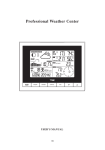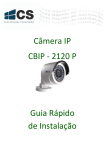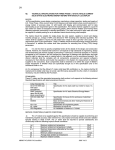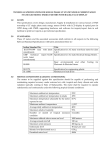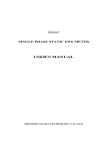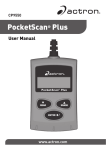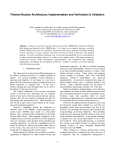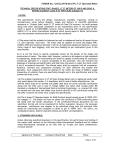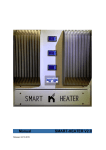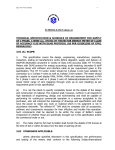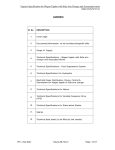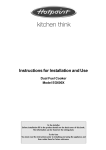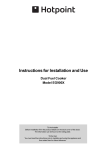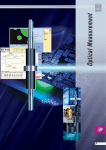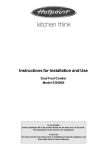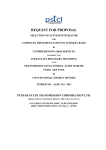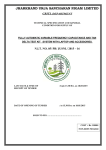Download MPPKVVCL/FSP/ F-02 /modified SBD Vol II 39 Details of meter
Transcript
251 39 (i) (ii) (iii) (iv) (v) (vi) (vii) (viii) (ix) (x) 40. 41. (i) (ii) 42 43. 38 Details of meter design for which above BIS certification has been obtained: Ratio of Ib to Imax Please provide Material of meter body Please provide Type of energy registering counter Please provide Type of technology Please provide Grade of printed circuit Board material Please provide Type of assembly of component used Please provide (SMT) Meter constant (Imp/KWh) Please provide Auxiliary power circuit (with PT or PT Please provide less) Current circuit (CT/Shunt combination Please provide or only shunt) Accuracy Class Please provide ISO accreditation no. & dt. with its Please provide validity Past Experience Whether the details of orders YES/NO received and quantity supplied is indicated in the schedule of past experience. Confirm whether copy of the orders YES/NO along with technical specification is enclosed with the tender. Whether meter has Six YES/NO programmable Time of use facility Other parameters/features not Conform to Technical specification covered in the above GTP and IS:13779/1999 (with its latest amendment). TECHNICAL SPECIFICATION OF 3 PHASE 4 WIRE STATIC TRIVECTOR ENERGY METERS FOR DTR METERING 38.1 SCOPE: This specification covers the design, engineering, manufacture, assembly, inspection, testing at manufacturers Works before dispatch and supply of high precision three phase four wire 3x240 volt, 40-200 Amp static Electronic tri-vector energy meter of accuracy class 1.0, capable of primarily performing functions of tariff meters and GSM modem (GPRS enabled) with store and forward facility with suitable accessories for automatic and remote data transfer from Electronic energy meters. The complete meter unit i.e. meter, internal CTs and modem shall be housed in the same encloser. The meter shall have provision in such a way that LV side cable of Distribution Transformer shall be directly passed through the meter for current measurement. Piercing screws shall be used in the meter for voltage connection The meter should be capable to record and display active energy, apparent energy, reactive energy and maximum demand KW/KVA for 3 phase 4 wire AC balanced/ unbalanced loads for a power factor range of 0 lag, unity and 0 lead. Meters shall be supplied along with basecomputer software’s (BCS) suitable to read the meter remotely as per the details given in this specification. 38.2 STANDARD APPLICABLE: Unless otherwise specified elsewhere in this specification, the performance and testing of the meters shall conform to the following Indian/International Standards and all related Indian/International standards to be read with upto-date and latest amendments/revisions thereof: Indian Standard No. IS:13779/1999 with latest amendment CBIP Technical report No.88 (with latest amendments) IS 12063 IS 5133/1969 (Part II) MPPKVVCL/FSP/ F-02 /modified Title Specification for AC static watt hour meter for class 1 & 2 Specification for AC static Electrical Energy Meters International & Internationally recognized standard IEC 62053-21 Specification for degree of protection for enclosure. Specification for boxes for the enclosure of electrical accessories SBD Vol II 252 IS:9000 Basic environmental and other Testing for Electronic & Electrical items. Specification for engineering plastic IS:11731 38.3 CLIMATIC CONDITIONS: The meters to be supplied against this specification should be capable of performing and maintaining required accuracy under extreme hot, cold, tropical and dusty climate and solar radiation typically existing in state of M.P. The meter shall be required to operate satisfactorily and continuously under the following tropical climatic conditions: (a) (b) (c ) (d) (e) (f) (g) (h) (i) (j) (k) (l) (m) 38.4 Maximum ambient air temperature Maximum ambient air temperature in shade Maximum temperature attainable by the meter exposed to sun Minimum ambient temperature Average daily ambient air temperature Maximum relative humidity Number of months of tropical monsoon condition Maximum altitude above mean sea level Average annual rain fall Maximum wind pressure Isoceraunic level (days per year) Seismic level (horizontal accn.) Permitted noise level o 55 C o 45 C o 60 C o (-) 5 C o 40 C 95% 4 months 1000 meters 150 cms 200 kg/sq.m 40 0.30 g 45.db TECHNICAL REQUIREMENT & DESIGN CRITERION Meters are required for installation in the premises of LT consumers. The basic system parameters wherein these meters will be installed shall be as under:- Sl.No. 1. 2. 3. 4. 5. 6. 7. Item Type of installation System voltage (phase to neutral) System frequency No. of phases System earthing Resistance to surge voltage of 1.2/50 Micro sec. Test voltage at 50 Hz Specification Indoor/Outdoor 3x240V + 20% to - 40% three phase 50 Hz ±5% 3 phase 4 wire Solidly grounded 6 KV peak 2 KV RMS for 1 minute The meter shall be 3 phase 4 wire type, suitable for continuously 240 VAC (Phase to Neutral) and shall be capable of withstanding twice the nominal voltage between phase to neutral (or earth) for short duration. 38.5 POWER CONSUMPTION Voltage Circuit: The active and apparent power consumption in each voltage circuit (per phase) including power supply of meter at reference voltage, reference temperature and reference frequency shall not exceed 2 Watts and 10 VA respectively. Current Circuit: The apparent power taken by each current circuit (per phase) at basic current, reference frequency and reference temperature shall not exceed 4 VA as per IS:13779. Auxiliary Power: The meter shall draw power for working of electronic circuit from phase & neutral. STARTING CURRENT: The meter should start registering energy at 0.4% of basic current at UPF as per IS:13779. RUNNING WITH NO LOAD: When 115% of rated voltage is applied with no current flowing in current circuit, the test output of the meter shall not produce more than one output pulse count as per IS:13779. RADIO INTERFERENCE SUPPRESSION AND ELECTROMAGNETIC CAPABILITY: The meter shall not generate, conduct or radiated noise, which would interface with the other requirement. The above shall conform to the requirement listed in the applicable standards. The meters shall work satisfactorily in the absence of neutral and shall work even if any two voltage wires are extended to the meter. MPPKVVCL/FSP/ F-02 /modified SBD Vol II 253 Meter shall have facility to allow downloading of selective data at faster speed to save the time while reading the meter for billing purpose through AMR or MRI. The downloading of billing data should be possible in less than 3 minutes. Overall Accuracy offered to the system shall be – Class 1.0 38.6 SALIENT FEATURES The meters shall make use of Non Volatile Memory capable of storing & retaining all the data required to be stored, without the help of any power source or battery back up. Computation of demand shall be on the basis of Real Time Clock of the meter itself. Provision shall be there to do the billing operation automatically at a predefined date by programming the meter. If required, billing shall also be possible with the press of MD reset button. Meters covered under this specification shall be fully static type with non-volatile memory to register various billing parameters and complete with other features as detailed out in this specification. Any other design meeting technical specification or features/accuracy etc., better than this specification and manufactured as per relevant IEC/IS/CBIP report shall also be acceptable. Meters shall be suitable for accurate measurement and display of energy and other billing parameters within the specified limits of errors under balanced and unbalanced load conditions in a poly phase network. Indications shall be provided on display to show the healthiness of phase voltage. The meter shall be fully programmable by the user for TOD timings and billing dates etc. For security reasons, the meter operating software should have at least “two level write protection” against any modification/editing of the parameters, data, settings etc. except those required for Billing data, TOD metering. The meter shall conform to the degree of protection IP 54 of IS: 12063/IEC: 529 for protection against ingress of dust, moisture and vermin’s. The meter-base & meter-cover shall be made of high grade, fire- resistant, non-inflammable, highgrade and good quality engineering plastic. The meter shall have provision in such a way that outgoing cable of transformer shall be directly passed through the meter for measurement. Piercing screws shall be used in the meter for voltage connection. The meter shall be suitable to accommodate aluminum cable of 100A current carrying capacity. The meter connection arrangement should be such that so there is no need to remove insulation for connecting cable for current measurement. Design should support thread through concept where connecting cable directly passed through the meter for measurement. As the cable directly passed through the meter, the offered meter should not have provision for meter terminal connection as well as terminal block. The entire design and construction shall be capable of withstanding stresses likely to occur in actual service and rough handling during transportation. The meter shall be convenient to transport and immune to shock and vibrations during transportation and handling. 38.7 POWER FACTOR RANGE: The meters shall be capable to record over full power factor range of Zero Lag-Unity- Zero Lead. However for specified accuracy the power factor range shall be as per IS. 38.8 CALIBRATION, CONFIGURATION & PROGRAMMING The Meter should be only factory calibrated, configured and programmed. No device, such as potentiometers shall be used which can result in change of calibration at site. The above activities should not be possible at site through the use of user software or any such means. It shall, however, be possible to check the accuracy in the field by means of the test output. No setting points/setting registers etc. shall be provided for adjustment of measurement errors. Once finalised, the meter constants shall be freezed and it shall not be possible by the manufacturer or the user to alter the meter constants either at factory or at site. Provision shall be made to read various billing parameters and tamper data recorded by meter through a meter reading instrument. This arrangement can be through an optical port. Provision shall be made to seal the optical port to ensure proper security. MPPKVVCL/FSP/ F-02 /modified SBD Vol II 254 38.9 DISPLAY: The meters shall have bright LCD Electronic display with backlit & with minimum 7 digits to read up to one tenth of KWh with another digit for legend. The decimal digits shall be clearly distinguished from integral digits. The back lit should not glow during power off condition. The LCD shall be of STN o o (Super Twist Nematic) type designed suitably to withstand temperature of 80 C (storage) & 65 C (operation). o (i) When the meter remains at a constant temperature of 65 C for a period of 30 minutes, the character of LCD should not deform. (ii) After keeping the meter at a constant temperature of 80oC for a period of 30 minutes and when restores at normal temperature, LCD display should work as in normal conditions. o o The LCD display should have a wide viewing angle of 45 C to 60 C and up to one-meter distance, for clear visibility of the display of the meter reading. Large viewing area with large display icons is preferred. There shall be 7 segments 7 digits for display of parameters value. The registered parameters shall not be affected by loss of power. The display shall not be affected by electrical and magnetic disturbances. The meter shall make use of non-volatile memory capable of storing and retaining all the data required to be stored, without the help of any power source or battery back up and shall have a minimum retention time of 12 years under un-powered condition. The minimum character height X width shall be 10 X 5 mm. The accuracy of display parameters for all parameters shall be matching with the accuracy class of meter as per IS. The display of various parameters shall be scrolling one after another. The display shall have ON time of at least 10 seconds for each measured value. 38.10 DISPLAY PARAMTERS AND SEQUENCE The meter shall display the required parameters in two different modes as follows:a) General Requirements (I) Auto display mode i) Date DD:MM:YY ii) Time HH:MM iii) Cumulative kWh iv) MD KW/KVA v) Instantaneous P.F with sign of Lag / lead vi) Average power factor of the last month vii) Main Billing active KWh viii) TOD 1,2,--,6 Billing active KWh ix) Billing MD kW/KVA (II) Display Parameter Push Button mode The display of the following parameters shall be continuously scrolling one after another through push button. The display shall have ‘ON’ time of at least 10 seconds of each measured value, except LCD segment check. The LCD segment check shall be on meter display for minimum 2 seconds. Display parameters shall move forward if button pressed prior to the programmed time for display of each parameter. i) ii) iii) iv) v) vi) vii) viii) ix) x) xi) xii) xiii) xiv) xv) xvi) xvii) xviii) xix) xx) LCD segment check Date DD:MM:YY Time HH:MM Rising demand register MD reset count Cumulative kWh energy register Cumulative kVArh lag energy register Cumulative kVArh lead energy register Cumulative kVAh energy register KW / KVA MD register Cumulative MD register KW/KVA Instantaneous P.F with sign of Lag / lead Frequency TOD 1,2,--,6 Cum. KWh TOD 1,2,--,6 Cum. KVAh TOD 1,2,--,6 MD KW Average power factor of the last month Billing MD kW/KVA Billing MD date Billing MD time MPPKVVCL/FSP/ F-02 /modified SBD Vol II 255 xxi) xxii) xxiii) xxiv) xxv) xxvi) TOD 1,2,--,6 Billing MD registers Main Billing KWh register TOD 1,2,--,6 Billing KWh registers Main Billing KVAh register TOD 1,2,--,6 Billing KVAh registers Tamper information-This shall be displayed when tampered with following. a) Date of last tamper occurrence b) Time of last tamper occurrence c) Number of times meter tampered b) Programmable Optional Requirements: i) Phase wise current ii) Phase wise Voltage iii) Instantaneous Power - A V KW/ KVA c) View Parameters:(Information required through meter reading instrument on BCS) i. Phase wise current A ii. Phase wise voltage V iii. Active energy KWh iv. Reactive energy lag KVArh lag v. Reactive energy lead KVArh lead vi. Apparent energy KVAh vii. MD during the month KW/ KVA viii. Avg. P.F. of last 3 months ix. Tamper information x. Present demand KW/ KVA xi. Instantaneous Power factor In two digit with indication of lag/lead xii. Load survey xiii. All balance parameters of (a) and (b) above MPPKVVCL/FSP/ F-02 /modified SBD Vol II 256 38.11 METER READING AT POWER OUTAGE: Provision to read the meter in no power condition shall be made. The same push button shall be used for display the auto scroll mode during power outage. A suitable internal/ external device could be used so that display of readings could be possible at least twice considering that continuous power outage will not be for a period of exceeding 24 Hrs. 38.12 MAXIMUM DEMAND REGISTRATION Maximum demand computation shall be updated based on sliding window principle only and demand integration period of 15 minutes programmable with updates of 5 minutes for 15 minutes IP. The meter shall monitor during each integration period of the month & display maximum value occurred. The MD integration cycle shall be on the basis of real time. However, the real time clock of the meter shall be used only for the purpose of time matching and for computation of maximum demand the internal clock of meter shall be made use of. 38.13 BILLING REGISTERS/ MD RESET: Each register shall have an associated billing register. When a billing operation occurs, the contents of the rate registers shall be transferred to there billing equivalents. The meter shall display the maximum demand reset count. Billing operation may be caused by any of the following means: Automatic Billing Automatic billing operation shall also be supported. On user specified/programmed day the billing operation shall occur at 00:00 hrs. Manual Billing The left-hand button on the front of the meter shall be capable of reset maximum demand. Pressing the left-hand button shall then cause a billing operation, which includes resetting any maximum demand registers that are in operation. Only one manual billing operation shall be possible in any given 15 minutes. Subsequent presses of the MD reset button shall be ignored if a manual billing operation has already occurred within 15 minutes. Electronic Billing Sending a secure MD reset message to meter via the optical port shall cause a billing operation. Normally this option shall be disabled. 38.14 CUMULATIVE DEMAND REGISTERS The cumulative demand registers keep a running total of the value of maximum demand registers, and are updated each time billing occurs. 38.15 LOAD SURVEY The meter shall have non-volatile memory for recording load survey for KW or KVA (programmable). The load survey data shall be logged for last minimum 35 days for interval of 15 minutes. 38.16 TAMPER FEATURES a. The following tamper information shall be available in the meters to detect common ways of tamper & fraud. i) Missing potential detection: The meter shall detect Potential missing and record this information along with date & time of occurrence and restoration of the event and phase indication. ii) CT reversal Detection: The meters shall detect and indicate the occurrence of CT reversal on meters display along with phase indication and shall also store the date & time of occurrence and restoration in the non-volatile memory. Even if meter detects such a condition, the recording of KWh shall be done in positive direction only. iii) Current Imbalance (CT shorting/by-passing): In case of CT open or shorting, which may result in the current imbalance between the phases, the tamper indication should appear by means of measuring neutral current. iv) Voltage Unbalance: The meter shall be capable of detecting and recording occurrences and restoration of voltage unbalance as an event. MPPKVVCL/FSP/ F-02 /modified SBD Vol II 257 v) Power ON/OFF: Meter shall be capable of detecting and recording power off of all voltages not present. The event shall be recorded on the next power up. At the same time, power on event shall be recorded. b. External Magnetic Influence: The meter shall not get influenced by any external magnetic fields (AC Electro Magnet or DC Magnet) as per value(s) specified in IS:13779 with its latest amendment for AC Magnetic Field. However, the meter alone should comply up to 0.27 Tesla DC. The meter accuracy or accuracy in display under normal conditions shall not be affected by placement of a permanent magnet of 0.27 Tesla ± 5%, anywhere on the surface of meter without meter box. On application of external DC and AC magnetic field of higher intensity (abnormal magnetic induction) against which meter is not immune, the meter should log the events of abnormal magnetic induction with date and time. The positive error may be beyond the limit of 4% but not exceeding power value equivalent to the product of rated voltage and maximum current. c. Application of abnormal voltage/frequency: (I) The accuracy of the meter, Real time clock disturb, Memory data corruption, meter functioning hang up etc. should not occur with the application of abnormal voltage/ frequency such as spark discharge of approximately 35KV with 0.01-10 mm spark gap in any of the following manner when applied for 10 minutes: i) On any of the phases or neutral circuit ii) On any connecting wires of the meter iii) At any place in load circuit iv) Spark on meter body. (II) Meter should also be immune for tamper by application of remote loop induction device (jammer). When meter is subjected to 35 KV abnormal voltage, frequency burst and remote loop induction device (jammer), it should not hang and in case it hangs once it should remain hanged permanently. d. Along with the information, the meter shall also record the instantaneous values of all three-phase voltages, three-phase currents and three-phase power factors to elaborate the existing condition during all the type of tamper events. e. The meter shall record min. 200 events of aforementioned tampers (occurrence + restoration) along with date and time of occurrence and restoration of each and every event. The event recording shall be compartment-wise roll over type i.e. it shall always maintain record of last 200 events occurred. f. Phase Sequence Reversal: Meter shall operate and record satisfactorily irrespective of phase sequence of input supply so long as phase association between voltage and current circuits is in order. g. Neutral Missing: The meters shall work properly even if neutral is not available and shall work satisfactorily even if any two of potential wires are extended to it. h. Logics for design of above indicated tamper, the value of voltage, current, time etc. to be selected for design of tamper logics shall be in consultation with the purchaser. (The last tamper event as per above tamper is to be included in the DISPLAY and rest of the details in VIEW PARAMETERS). Provision shall be made for push button to initiate display parameter in the front of the meter. Provision shall be made for maximum demand (MD) reset push button with provision of sealing. An operation indicator in the form of blinking visible signal shall be provided to indicate that the meter is operating satisfactorily. Manufacturer may confirm whether the blinking visible signal is of weighted pulse and this can be effectively used for verification of accuracy. Tamper information shall remain on display, unless authentic command is received. Note : 1. 2. The meter shall not get affected by any remote device. The manufacturer should furnish detailed explanation as to how the meter is able to detect/ protect recording the above tamper and fraud features with sketches and phaser diagram. Additional features, if any, in the meter may also be clearly indicated. 38.17 BILLING POINT REQUIREMENTS: The predefined date and time for registering the billing parameters of kWh, PF and KW/kVA MD as well as Tamper Count and Power-On hours readings shall be at 00.00 hours of the first day of each calendar (billing) month. All billing parameters shall be transferred to billing registers and shall be displayed on auto cyclic display mode referred to as "BILLING PARAMETERS". MPPKVVCL/FSP/ F-02 /modified SBD Vol II 258 The above billing data, TOD register's data, load survey data, tamper information and instantaneous parameters data shall all be retrievable through the meter's communication port through a common meter reading instrument (CMRI) and shall be transferred (downloaded) to a PC with Windows based software to get complete details in numerical and/or graphic form. The necessary base computer software (BCS) for this purpose shall be provided by the supplier with complete details. Further, apart from instantaneous parameters like voltage, current, PF, and readings of billing parameters, energy registers, TOD registers etc., the following additional parameters should be made available at the BCS end: a) MD reset count. b) Billing Parameters for last 6 Histories. 38.18 PERFORMANCE ON DC INJECTION: Apart from all the technical requirements as specified above, it should also be ensured that meter should not stop and record consumption accurately even on injection of DC voltage in neutral. 38.19 TOD TARIFF/DEMAND The meter should be capable of registering the time-of-day energy and maximum demand. The time zones shall be provided at the time of ordering. The meter should have in-built capacity to define up to six time zones. The change of the TOD time-period(s) or defining additional TOD zones should be possible through CMRI with special authenticated command from the BCS so that only authorized person(s) can make such changes. The main control of this system along with proper security password/code should be available on one or more computers located at the authorized location(s) as per the directions to be given by the Purchaser. Provision should be made for automatic reset of maximum demand at the end of pre-defined period (e.g. end of the month). The billing parameter at the time of automatic reset of the maximum demand shall be programmable. In addition reset of maximum demand shall be possible through push button or through a hand held terminal capable of communicating with the meter. In every case the design shall include provision of updating of cumulative demand register with updating of reset counter. Necessary compatible meter application software for various programmable features as discussed above in the meter and also necessary software for the IBM compatible computer to obtain various details as discussed above shall be provided by the supplier. No separate cost will be borne by the purchaser on this account. 38.20 DATA SECURITY: The data transfer from the meter to MRI and MRI to computer should be fully secured and any unauthorized change in data should be indicated on computer system. There should be multi level password on the base computer system and in the meter to prevent any unauthorized change of TOD timings or resetting of demand, reading of meter etc. 38.21 A suitable battery of adequate storage energy shall be used for energy supply to real time clock during no voltage or power off condition. The information of meter including integration etc. shall be independent of requirement of battery. The minimum life of lithium battery should be seven years. Under battery weak condition, an indication shall appear on the BCS display. 38.22 OUTPUT DEVICE: The meters shall have a test out put in the form of a blinking LED for testing of the meters accuracy. Testing shall also be possible through optical port accessible from the front and can be monitored with Meter Reading Instrument having high-resolution display. The meters shall give high-resolution energy values directly to meter reading instrument. The resolution will be sufficient to enable conduction of the starting current and accuracy test in less time. 38.23 COMMUNICATION CAPABILITY: (a) The meters shall have galvanically isolated optical communication port so that it can be easily connected to hand held common meter reading instrument for data transfer. The optical port shall be located in the front of the meter & shall have adequate sealing arrangement to seal it. Serial communication Protocol shall be adopted for data communication. MPPKVVCL/FSP/ F-02 /modified SBD Vol II 259 (b) Remote communication mode for data retrieval: The meters would be mounted at height on the secondary of distribution transformers and it is difficult to take meter readings at height therefore reading of meter should be taken by choosing any one of the following means: (c) (i) Through GSM Modem: The GSM Modem shall be provided with store and forward feature in the same enclosure of meter. Modem shall be connected such that the galvanically isolated port of meter shall be free for the data downloading through CMRI. The specification of modem is as per subsequent paras. (ii) Optical port of the meter shall be extended suitably downwards, 1.5 meters above the ground level such that meter could be read easily through the MRI. Extended port shall be robust & well protected with locking and sealing arrangement. Meter Reading Instrument (MRI): i. The MRI suitable for reading shall be supplied in the ratio of one for each 300 nos. of meters free of cost along with battery charger. ii. The MRI shall have facility to store minimum 100 nos. of meter’s data. Further, there should be a facility in MRI to provide the transfer of meter data to computer through RS 232 or USB port. iii. The MRI shall be capable for down loading readings of other makes of meters. The bidder shall give an undertaking to this effect It shall be responsibility of the meter manufacturer to provide the required software and all the facilities required by the purchaser, to use the MRI for reading and retrieving the data from the meter and to download the data to Base Computer free of cost till the expiry of guarantee period. 38.24 BASE COMPUTER APPLICATION SOFTWARE For efficient and speedy recovery of data read through AMR/CMRI/HHU, Base computer software shall be supplied having the following specifications as below: The BCS software shall be user friendly. Windows based Base computer software shall be supplied. Base Computer software shall give all details adequate for analysis and load surveys parameters. The software shall have the facility to convert all the consolidated information / data of selectable parameters into ASCII format. EDP department of purchaser can generate its own DBF (data base files) to downloaded all the required information into it. ix. Platform: The BCS shall be executable on all WINDOWS system. The BCS shall be suitable to run on IBM compatible PC hardware platform. x. Meter Data Display:The software shall show electrical condition existing at the time of reading the meter in tabular forms as well as graphical format (Phase diagram) All the information about energy, maximum demand and their respective TOD register reading, billing register readings shall be shown in a manner which user can easily understand. All the load survey data shall be available in numerical as well as graphical format. It shall be possible to view this data daily, weekly, and monthly format. The load survey graph will show values where the cursor is placed for the selected or for all parameter. All the information about abnormality events shall be accompanied with date and time stamping along with 'snap-shot' of respective electrical conditions. This information shall be displayed in the sequence in which it happened in cumulative format as well as summary format. The software shall be capable of preparing CMRI to read the meter information or time setting of the meter. xi. Support Display: There shall be "user friendly" approach for viewing meter data for the reading collected now or for the reading collected in the past. All information about a particular consumer will be sorted out and available at one place so that locating any consumer 's past data is easy. It shall be possible to retrieve/locate data on the basis of either one of the following particulars: e) f) g) h) Consumer's ID/Numbers. Meter Sr. No. Date of meter reading. Location. MPPKVVCL/FSP/ F-02 /modified SBD Vol II 260 xii. The Data Transfer: It shall be possible to transfer data to and fro from CMRI through serial interface. xiii. Configurability: It shall be possible to have selective printing of all available data of the meter. Print out shall not include anything and everything available with the BCS. The software shall support "print wizard" whereby user can decide what to print out. The use of the software need not revert back to the supplier of the software for modifying the software just to print what he desires. BCS shall have facility to export data to ASCII or spreadsheet format for integrating with the purchaser's billing system. Here again an "Export wizard" or similar utility shall be available whereby user can select file format, what data to export, the field width selection etc. xiv. Security:The BCS shall have multilevel password for data protection and security. The first level shall allow the user to enter the system. The different software features shall be protecting by different passwords. The configurable of passwords shall be user definable. The software installed on one PC shall not be copiable on another PC. xv. BCS shall have feature to read data through AMR in different modes through GSM/ GPRS infrastructure. xvi. Help: The exhaustive online help shall be available with the software so that user can use all the features of the software by just reading the help contents. 38.25 APPLICATION PROGRAMME INTERFACE (API) The bidder shall provide Application Programme Interface (API) to read their meters and convert the meter data as per IEEMA MIOS standard. Supply of API with the meter is mandatory. 38.26 CONSTRUCTION OF THE METER The components on the PCB shall be of surface mounted to ensure reliable performance even under shock/vibration. Body of the meter shall be designed suitable for projection mounting. The meter should be made of high quality raw materials to ensure higher reliability and longer life. The meter should be compact and reliable in design e.g. to transport and immune to vibration and shocks involved in transportation/ handling. The construction of the meter shall be suitable for its purpose in all respects and shall give assurance of stable and consistent performance under all conditions especially during dust storms/heavy rains/very hot days. The meter shall conform to the degree of protection IP 54 of IS: 12063/IEC: 529 for protection against ingress of dust, moisture and vermin’s. All insulating material used in the construction of the meter shall be non-hygroscopic non ageing and of tested quality. All parts that are likely to develop corrosion shall be effectively protected against corrosion. The construction of the meter shall be such as to be sealed independently and prevent unauthorised tampering. Meters described above shall be installed out door, directly under the sun and extreme weather conditions. Suitability of such use shall also be confirmed. 38.27 METER CASE AND FRONT DOOR: The meter shall have a case, which should be sealed in such a way that the internal parts of the meter are not accessible unless body is broken. Minimum three sets of seals i.e. for Piercing screws, meter cover and the front door shall be provided. The meter shall be made of self extinguishing polycarbonate/Engineering Plastic. The case shall be so constructed that any temporary deformation may not effect the satisfactory operation of the meter. The meter unit shall have opaque front hinged door with suitable sealing arrangement (screws). The front door shall be sealed independently & over the terminal cover. Approach to the MD reset button, reading button and optical port shall only be possible after opening the front cover. 38.28 TERMINAL (PIERCING SCREW) COVER: The PT Piercing screw cover for the meter shall be extended type, which can be sealed independently & over the meter cover. The PT terminals shall not be accessible without removing the seals of the terminal cover when energy meter is mounted on the meter board/ wall. 38.29 MOUNTING ARRANGEMENT Suitable wall mounting arrangement for the complete meter unit shall be provided such that the mounting bolts shall be operated/ opened or accessible only after operation of a set of seal. Proper locking arrangement shall be provided to protect from unauthorised removal of meter from its mount. MPPKVVCL/FSP/ F-02 /modified SBD Vol II 261 38.30 INSULATION: The meter shall have durable and substantially continuous enclosure made of wholly insulating material, including the terminal cover, which envelops all metal parts with the exception of small parts and should withstand an insulation test at 4 KV. 38.31 RESISTANCE TO HEAT AND FIRE: The terminal block and the meter case shall ensure reasonable safety against the spread of fire. These should not be ignited by thermal overload of live parts in contact with them. (a) SEALING OF THE METER: The meter body shall be provided with 2 nos. polycarbonate tamper evident seals having 6 digit serial no. The nos. of the seal shall be unique and should not be repeated in any case. All the seals should be provided on front side only. Access to the working part should not be possible without breaking the seals. Provision of at least 2nos. seals on front door, 1 no. seal each on maximum demand device and communication port, 2nos. seals on the terminal cover shall also be made. Rear side sealing arrangement is not acceptable. The polycarbonate seals shall have proper locking to avoid opening of the seal in any case by means of tampering. (b) TRACKING SOFTWARE FOR SEALS: It is mandatory to provide Tracking and recording software for all new seals so as to track total movement of seals starting from manufacturing, procurement, storage, record keeping, installation, series of inspections, removal and disposal etc. 38.32 CONNECTION DIAGRAM & TERMINAL MARKINGS: The connection diagram of the meter shall be clearly shown on inside portion of terminal cover & shall be of permanent nature. Meter terminals shall also be marked & this marking should appear in the above diagram. 38.33INSTALLATION CHECK: While installing the meter, it shall be possible to check the correctness of the connection to the meters and there polarity from the functioning of the meter with the help of CMRI under load condition. The phase sequence and phased association of voltage and current can be checked with the help of CMRI. 38.34 GUARANTEED TECHNICAL PARTICULARS: The bidder shall furnish all the necessary information as desired in the Schedule of Guaranteed Technical Particulars and data, appended with this Specification. If the bidder desires to furnish any other information(s) in addition to the details as asked for, the same may be furnished against the last item of that Annexure. 38.35TECHNICAL DEVIATIONS: Any deviation in Technical Specification as specified in the Specification shall be specifically and clearly indicated. 38.36 NAME PLATE AND MARKING: Every meter shall have a nameplate clearly visible and indelible and distinctly marked in accordance with relevant standard (latest version). The following information should appear on the name plate affixed on to the meter:(i) Manufacturer’s name or trade-mark and place of manufacture. (ii) Designation of type (iii) Number of phases and number of wires for which the meter is suitable. (iv) Guarantee period – 5-1/2 years. (v) Purchase Order No. & Date. (vi) Property of MPEZ. (vii) Bar coding of SN, Month & Year of manufacture (viii) Sign of Insulation Class (ix) Serial number, year and month of manufacture (x) Principal unit in which the meter records (xi) Reference voltage (xii) Basic current and rated maximum current (xiii) Reference frequency in Hz (xiv) Meter constant MPPKVVCL/FSP/ F-02 /modified SBD Vol II 262 (xv) (xvi) (xvii) Accuracy class Reference temperature ISI mark and licence number 38.37 TESTS: a. Type Test : Meter shall be type tested as per relevant standards (with latest amendments). Type test certificates from any one of the standard laboratories NABL accredited for particular equipment/test. b. Acceptance tests : All Acceptance tests as laid down in Indian Standards shall be carried out. The accuracy of display parameters shall be verified at the time of inspection in line with class of accuracy of meter. c. Routine Tests: All the routine tests as stipulated in relevant standards in addition tamper and fraud protection tests as per clause-22 shall be carried out and test certificates shall be furnished for approval of the purchaser. 38.38 TEST FACILITIES: a) The tests shall be carried out as per relevant Standards and test certificates shall be furnished for approval. The Bidder shall indicate the details of the equipment available with him for carrying out the various tests as per relevant Standards. The bidder shall indicate the sources of all materials. NOTE: The standard meters used for conducting tests shall be calibrated periodically at reputed Government Accredited Test Laboratories and test certificates shall be available at Works for verification by purchaser’s representative. b) The manufacturer shall have at least the following testing facilities to ensure accurate calibration :(i) Insulation resistance measurement (ii) Running at no load (iii) Starting current test (iv) Limits of error (v) Range of adjustment (vi) Power loss in voltage and current circuit (vii) Repeatability of error (viii) Transportation test (ix) Low load run test (x) Heating test c) Routine Test: Each and every meter of the offered lot shall undergo the routine tests as well as functional tests as per relevant standards, routine test report of all the meters of offered lot shall be handed over to the Inspecting Officer prior to carrying out the acceptance test. 38.39 INSPECTION : a. The purchaser reserves the right to get type tests done in respect of any meter, or Box from any of the lots received at any Destination Stores at supplier’s expenses. 38.40 RANDOM SAMPLE TESTING AFTER RECEIPT AT STORES: The consignment of meters received at Area Stores shall be accepted only after acceptance test of meters at CPRI/ERDA or any NABL accredited lab. Some sample of meters shall be selected randomly from a lot of meters supplied and sent to CPRI for acceptance test as per relevant ISS and as per procedure prescribed in following paras. If the sample fails in the above tests, the entire lot will be rejected and testing charges shall be recovered from the supplier. 38.41 QUALITY ASSURANCE PLAN: The designed life of the meter shall be minimum 20 years and to prove the designed life, the firm shall have at least the following Quality Assurance Plan:(i) The factory shall be completely dust proof. (ii) The testing rooms shall be temperature and humidity controlled as per relevant standards. (iii) The testing and calibrating equipments should be automatic and all test equipment shall have their valid calibration certificates. MPPKVVCL/FSP/ F-02 /modified SBD Vol II 263 (iv) Power supplies used in testing equipment shall be distortion free with sinusoidal, wave- forms and maintaining constant voltage, current and frequency as per the relevant standards. (v) During the manufacturing of the meters the following checks shall be carried out. (a) Meter frame dimensions. (b) The assembly of parts shall be done with the help of jigs and fixtures so that human errors are eliminated. (c) The meters shall be batch tested on automatic, computerized test bench and the results shall be printed directly without any possibility of human errors. The Bidder shall invariably furnish the following information along with his bid, failing which his bid shall be liable for rejection. Information shall be separately given for individual type of material offered. (i) Statement giving list of important raw materials, names of sub-suppliers for the raw materials, list of standards according to which the raw materials are tested, list of tests normally carried out on raw material in presence of bidder’s representative and copies of test certificates. (ii) Information and copies of test certificates as in (i) above in respect of bought out accessories. (iii) List of manufacturing facilities available. (iv) Level of automation achieved and list of areas where manual processing exists. (v) List of areas in manufacturing process, where stage inspections are normally carried out for quality control and details of such tests and inspections. (vi) List of testing equipments available with the bidder for final testing of equipment specified and test-plant limitations, if any, vis-à-vis type, special acceptance and routine tests specified in the relevant standards and this specification. These limitations shall be very clearly brought out in schedule of deviations. (vii) The manufacturer’s laboratory must be well equipped for testing of the meters. They must have computerized standard power source and standard equipment calibrated not later than a year (or as per standard practice). The details of testing facilities available for conducting (a) The routine tests and (b) Acceptance tests shall be furnished in Schedule annexed with tender document. 38.42 MANUFACTURING ACTIVITIES: (i) All the materials, electronics and electrical components, ICs used in the manufacture of the meter shall be of highest quality and reputed make to ensure higher reliability, longer life and sustained accuracy. (ii) The manufacturer should use Application Specific Integrated Circuit ASIC or Micro controller for metering functions. (iii) The electronic components shall be mounted on the printed circuit board using latest Surface Mounted Technology (SMT) except power components by deploying automatic SMT pick and place machine and re-flow solder process. The electronic components used in the meter shall be of high quality. Further, the Bidder should own or have assured access (through hire, lease or sub-contract) of the above mentioned facilities. The PCB material should be of glass epoxy FR-4 grade conforming to relevant standards. (iv) All insulating materials used in the construction of meters shall be non-hygroscopic, non-aging and of tested quality. All parts that are likely to develop corrosion shall be effectively protected against corrosion by providing suitable protective coating. (v) Quality should be ensured at the following stages: (a) At PCB manufacturing stage, each board shall be subjected to bare board testing. (b) At insertion stage, all components should undergo testing for conforming to design parameters and orientation. (c) Complete assembled and soldered PCB should undergo functional testing using test equipments (testing zig). (d) Prior to final testing and calibration, all meters shall be subjected to accelerated ageing test to eliminate infant mortality. (vi) The calibration of meters shall be done in-house. MPPKVVCL/FSP/ F-02 /modified SBD Vol II 264 38.43 DOCUMENTATION : a. All drawings shall conform to International Standards Organization (ISO “A” series of drawing sheet/India Standards Specifications IS:656. All drawings shall be in ink and suitable for micro filming. All dimensions and data shall be in S.I. Units. b. List of drawings and documents: The manufacturer shall furnish the following. (i) Two sets of drawing clearly indicating the general arrangements, fitting details, electrical connections etc. (ii) Technical leaflets (user’s manual) giving operating instructions. (iii) Three copies of dimensional drawings of the equipments. c. The manufacturing of the equipment shall be strictly in accordance with the approved drawings and no deviation shall be permitted without the written approval of the purchaser. All manufacturing and fabrication works in connection with the equipment prior to the approval of the drawing shall be at the supplier’s risk. d. Approval of drawings by purchaser shall not absolve the supplier of his responsibility and liability for ensuring correctness and correct interpretation of the drawings for meeting the requirements of the latest revision of application standards, rules and codes of practices. The equipment shall conform in all respect to high standards of engineering, design, workmanship and latest revisions of relevant standards at the time of ordering and purchaser shall have the power to reject the materials which, in his judgement, is not fully in accordance therewith. e. The manufacturer within 2 weeks of notification of award of contract, submit three sets of final versions of all the drawings as stipulated in the purchase order for purchaser’s approval. The purchaser shall communicate his comments/ approval on the drawings to the supplier within two weeks. The supplier shall, if necessary, modify the drawings and resubmit three copies of the modified drawings for approval. The supplier shall within two weeks, submit 10 prints and two good quality report copies of the approved drawings for purchaser’s use . f. Ten sets of operating manuals/technical leaflets shall be supplied to each consignee for the first instance of supply. g. One set of routine test certificates shall accompany each dispatch consignment. h. The acceptance test certificates in case of pre-dispatch inspection or routine test certificates in cases where inspection is waived shall be got approved by the purchaser. 38.44 GUARANTEE : (i) Defect Liability period shall as per clause GCC 27.10 of SCC Section 8 of the Bid document. 38.45 PACKING & FORWARDING: a) The equipment shall be packed in crates/boxes suitable for vertical/horizontal transport as the case may be, and suitable to withstand handling during transport and outdoor storage during transit. The supplier shall be responsible for any damage to the equipment during transit, due to improper and inadequate packing. The easily damageable material shall be carefully packed and marked with the appropriate caution symbol. Wherever necessary, proper arrangement for lifting, such as lifting hooks etc., shall be provided. Any material found short inside the packing cases shall be supplied immediately by supplier without any extra cost. b) Each consignment shall be accompanied with a detailed list containing the following information. i) Name of the consignee ii) Details of consignment iii) Destination iv) Total weight of consignment v) Handling and packing instruction vi) Bill of material indicating contents of each package vii) The packing shall be done as per the manufacturer’s standard practice. However, he should ensure the packing is such that the material should not get damaged during transit. 38.46 TECHNICAL SPECIFICATION OF GSM MODEM The modem shall be built in the meter enclosure and connected internally. The system shall be used for remote meter reading of the consumer meters via GSM infrastructure. The communication and reading shall be enabled with suitable Base Computer Software (BCS). The modem shall offer in-built intelligence and high speed data transfer rate or a kind of store-forward facility by which data from the MPPKVVCL/FSP/ F-02 /modified SBD Vol II 265 meter is read at regular intervals and stored in modem’s internal memory and forwarded to remote central station (as configured) for viewing billing and reporting via Base Computer Software. Various features of GSM modem (to be installed with electronic energy meter) are described as below: 38.46 (a) Power Supply Section Input supply d. e. The modem shall be powered up with the meter itself. Average Power consumption of the modem shall be 3 VA under idle condition and 6 VA during data transfer. Note: Power consumption may vary from site to site depending on signal strength at that particular location. Above values are typical values. Withstand capacity against surges should be according to Indian conditions i.e. 6.0 kV. The modem shall have capability to work under continuous power on condition. 38.47 GSM Section: The GSM module shall comply with the following: The modem shall operate in GSM 900/1800/1900 MHz Band. The modem shall be compliant with ETSI GSM Phase 2+ Standard. Class 4 (2W) @ 900 MHz Class 1 (1W) @ 1800/1900 MHz The modem shall support Point-to-Point transmission and Cell Broadcast features. It shall have auto dial feature. SIM Card Section For placing the SIM Card, a SIM Card Holder shall be provided on the GSM motherboard and shall be accessible only by removing the sealable cover. The SIM Card shall be of 3V Interface. Interlocking facility shall be provided under the device cover. RF section A SMA interface shall be provided on the GSM modem to which either a fixed or a wired (with magnetic base) Dual Band Antenna can be connected. The antenna should be of minimum 3dbi gain. Provision shall also be made to connect 14db high gain external yagi antenna to improve poor signal strength. Network Identification Section For determining the health of the device an LED shall be provided on the modem which shall depict the current functioning status (power up/ registered in network/ transmitting data). 38.48 EMI/EMC Specifications The GSM modem shall meet the following EMI/EMC specifications: 38.2 Electrostatic Discharge IEC61000-4-2 38.3 Fast Transient Burst IEC61000-4-4 38.4 Surges Immunity IEC61000-4-5 (Under Line to Earth & Line to Line immunity) 38.5 Conducted Emission CISPR22 (class B) 38.49 Mechanical Specifications The Mechanical Specifications of the modem shall be as follows: a. Modem shall be located in meter enclosure such that it has separate sealable opening. b. The portion of the meter where modem is placed shall have a suitable sealing arrangement so that the GSM SIM Card cannot be tampered with. 38.50 Environmental specifications The modem shall meet the following environmental specifications: Temperature: -10 degrees to +55 degree Humidity: - 95% RH (non – condensing) 38.51 Functional specifications MPPKVVCL/FSP/ F-02 /modified SBD Vol II 266 The modem should be an intelligent device and capable of providing the following functionalities: 38.52 Inbound dialing a) The modem should have inbound dialing facility ie. modem shall automatically dial to a particular GSM number (number of modem placed at central station end along with BCS server) at specified time (once in a day/week/month) for the purpose of meter reading. This configuration of the modem shall be made available to the user via offered Base Computer Software. b) If modem at consumer end could not establish connection to the modem at central station at specified time, then it shall retry the same as configured. 38.53 Outbound Dialling (a) (b) In case the data is required by dialing from the Central station end (Server end), then connection shall be established by the server to the device using AT commands and transparent communication mode shall be established. User shall have option to get the data directly from the meter or the data already available in the memory of intelligent modem. 38.54 Event based dialing (a) Other than regular dialing, the modem shall have feature of event based dialling in case of logging of tamper by the meter, without waiting for the interrogation from central station (BCS server) and meter data shall be sent to the central station (b) Further, the modem shall sent an SMS to predefined mobile number and the SMS shall contain meter serial no. The mobile number shall be configurable via BCS. (c) Event based dialing and SMS shall be applicable for the event types (tamper/anomally) as supported/recorded by the meter (d) When the modem is busy in collecting the data from the meter and the call comes to get the data, then priority shall be given to outbound call rather than data collection from meter. (e) The feature of event based dialing shall be user configurable. Provision of enabling and disabling of the feature shall be provided 38.55 VERIFICATION/TESTING OF MATERIAL SUPPLIED a) Type test Three (3) samples for Type Test shall be selected & sealed by authorised person of MPPKVVCL from the first lot received in contractor’s site stores. The selected samples shall be sent with complete details for type test at CPRI / ERDA / any NABL accredited test house. The type test charges shall be borne by the supplier. In case of successful type test results, supplies shall be continued. However, in case the meter(s) do not meet the requirement as per ISS/CBIP/Specification in type test(s), three more samples shall be selected from the supplies already received to get them type tested at contractor’s cost. In case of repeat failure in type test(s), the order of balance quantity including the quantity lying unused in the stores/ field shall be cancelled. d) Acceptance test v) On receipt of subsequent consignment of individual DI in contractor’s site Stores, set of meters as per relevant standards shall be selected randomly and sent to CPRI/ERDA for conducting acceptance test as per the prescribed procedure. vi) In case of failure of samples of lot/ sub-lot in the test(s) detailed in ISS, the similar testing procedure as described shall be repeated on another lot and if the lot fails consecutive second time the entire quantity of respective lot/sub-lot shall be rejected and shall have to be replaced by the contractor at his own cost. Repeated failure/poor results in the testing may render cancellation of order. vii) The supplies, at the option of employer, may be utilized in the field during the period of testing. In case of repeat failure in acceptance test(s), the order of balance quantity including the quantity lying unused in the stores/ field shall be cancelled. The guarantee period of quantity already supplied & used shall be doubled and payment for used meters shall be arranged after deducting 10% cost. viii) The employer also reserves the right to get additional samples for all or any of the selected tests at purchaser's cost at any independent test house at any stage of supply, if so considered necessary to ensure that the quality of meters being offered for inspection is same as already got type tested. In case of failure, the guarantee period of the quantity MPPKVVCL/FSP/ F-02 /modified SBD Vol II 267 already supplied by the contractor shall be doubled and employer reserves the right to cancel the balance quantity. e) In case of failure in type test or acceptance test, employer may allow the contractor to re-offer the material after change/ modification in the design of meters. The balance material shall be accepted only after successful Testing. The Testing charges shall be borne by the contractor. 38.56 GUARANTEED TECHNICAL PARTICULARS FOR 3 PHASE 4 WIRE AC STATIC TRIVECTOR ENERGY METERS FOR DTR S N Particulars 1 Name of manufacturer 2 Model 3 Standard Applicable 4 Rating (i) Accuracy class (ii) Rated voltage (iii) Rated current (iv) Rated frequency (v) Power factor (vi)Magnetic immunity Minimum requirement To be mentioned To specify IS:13779/ CBIP report 88 with latest amendment Class -1.0 3X240 V, +20% -40% Ib-40 Amps, Imax-100 Amps 50 Hz ± 5% 0 lag to unity to 0 lead As per CBIP-88 with latest amendments 100 Amps Should not produce more than one output pulse/count 5 (i) Continuous current rating (ii) Running with no load & 115% rated voltage 6 7 Short time over current Meter shall start and continue to register at current (unity PF) 8 Power loss at rated frequency & reference temperature 9 10 11 30 Imax for one half-cycle 0.4 % of Ib (i) Current circuit at rated current per phase Less than 4 VA (ii) Voltage circuit at rated current per phase Less than 2 W & 10 VA Momentary over voltage Dielectric voltage withstand Type of connection 12 Communication support 13 14 Life of RTC Battery Type of material used (a) Material (i) Base (ii) Meter cover MPPKVVCL/FSP/ F-02 /modified Offered As per relevant standard 6 KV AC or as per relevant standard The cable directly passes through the meter without any external CTs It should not be needed to remove insulation of consumer supply cable for current measurement of individual phases Provision of piercing screw for PT connection should be there. Galvanically isolated optical port with sealing arrangement Built in GSM modem with store and forward feature connected internally with the meter with separate port such that optical port shall be free for CMRI communication. specify High impact strength Engineering plastic High impact strength flame retardant UV stabilised with window of UV transparent poly carbonate SBD Vol II 268 S N Particulars 15 (iii) Screw Size of service cable passing Hole 16 Degree of protection 17 18 Auto Scroll Mode 18.2 18.3 Push button Mode Programmable Optional Requirements: View Parameters : (Display/ information required through meter reading instrument on BCS) 19.(i) (ii) 20 21 22 Offered Nickel/Tin plated Brass Suitable to accommodate aluminum cable of 100A current carrying capacity Meters shall be installed in consumer premises out door or indoor, directly under the sun and extreme weather conditions. Suitability of such use shall also be confirmed. Meter shall comply IP 54 of IS:12063/IEC: 529 for protection against ingress of dust, moisture and vermin’s. Type of display LCD (i) No. of Digits display 7 (One digit after decimal point) (ii) Character size of display 10x5 mm (Min) (iii)Operation suitability LCD suitable for operation up to o 80 C Display Sequence( display should be self explanatory) 18.1 18.4 Minimum requirement Reading in power off condition Type of arrangement made to display in power off condition Maximum Demand Registration Billing Registers/ MD Reset: Billing operation may be caused by any of the following means: Automatic Billing Manual Billing Electronic Billing Cumulative Demand Registers MPPKVVCL/FSP/ F-02 /modified As per specification As per specification As per specification As per specification Meter shall be able to display reading. To be explained -Computation shall be updated based on sliding window principle only. -Demand integration period of 15 minutes programmable with updates of 5 minutes for 15 minutes IP. -The meter shall monitor during each integration period of the month & display maximum value occurred Each register shall have an associated billing register. When a billing operation occurs, the contents of the rate registers shall be transferred to there billing equivalents. The meter shall display the maximum demand reset count. As per specification As per specification As per specification The cumulative demand registers keep a running total of the value of maximum demand registers, and are updated each time billing occurs. SBD Vol II 269 S N 23 Particulars 24 Downloading of selective data 25 BASE COMPUTER APPLICATION SOFTWARE 26 APPLICATION PROGRAMME INTERFACE 27 METER CASE AND FRONT DOOR: 28 Load Survey Minimum requirement Offered The meter shall have non-volatile memory for recording load survey for KW/KVA (programmable). The load survey data shall be logged for last Min. 35 days for interval of 15 min. Meter shall have facility to allow downloading of selective data to save the time while reading the meter for billing purpose through MRI/AMR. The time required for selective reading for billing parameter shall be less than 3 Min. For efficient and speedy recovery of data read through CMRI/HHU/AMR, and other activity as per TS The bidder shall provide application programme interface (API’s) to read their meters and convert the meter data as per IEEMA MIOS standard. Supply of API with the meter is mandatory. meter shall have a case, which can be sealed in such a way that the internal parts of the meter are accessible only after breaking minimum three sets of seals, one that of Piercing screw cover, meter cover and the front door meter unit shall have opaque front hinged door with suitable sealing arrangement (screws). Fixing/ Sealing arrangement (i) Fixing of meter (ii) Sealing of meter body (iii) Sealing of front door (iii) Sealing of maximum demand device (iv) Sealing of communication port (v) Sealing of piercing screw Cover MPPKVVCL/FSP/ F-02 /modified Suitable wall mounting arrangement for the complete meter unit shall be provided such that the mounting bolts shall be operated/ opened or accessible only after operation of a set of seal. Proper locking arrangement shall be provided to protect from unauthorised removal of meter from its mount. 2 nos. polycarbonate tamper evident seals or any superior sealing arrangement on front side of meter. Seals marked with “MPEZ”, company logo and 6 digit serial no. The nos. of the seal shall be unique Seal shall be provided on front side only. Meter cover shall be permanently / solidly welded with Base so that it could not be opened without breaking. 2 no. seals front door shall be extended type and can be sealed independently & over the terminal (piercing screw) cover) Provision for 1no. seal Provision for 1no. seal 2nos. seal piercing screw cover shall be extended type and can be sealed independently & over the meter cover) SBD Vol II 270 S N 29 Particulars Tracking software 30 (i) (ii) TAMPER FEATURES Injection of abnormal voltage and frequency of the order of 35 KV with the help of external device (iv) Effect on accuracy of external electromagnetic interference of electrical discharge, external magnetic field & DC current in AC supply or in neutral Suitability of meter to sustain over voltage i.e phase to phase voltage injected between phase & neutral Missing potential detection: (v) CT reversal Detection: (vi) Current Imbalance (CT shorting/ by-passing) (vii) Voltage Unbalance: (viii) Power ON/OFF: (ix) Neutral Missing: (iii) (xi) Phase Sequence Reversal MPPKVVCL/FSP/ F-02 /modified Minimum requirement Offered mandatory to provide Tracking and recording software for all new seals so as to track total movement of seals starting from manufacturing, procurement, storage, record keeping, installation, series of inspections, removal and disposal etc. As per TS As per TS Should sustain as per relevant standard The meter shall detect PT missing and record this information along with date & time of occurrence and restoration of the event and phase indication. The meters shall detect and indicate the occurrence of CT reversal on meters display along with phase indication and shall also store the date & time of occurrence and restoration in the non-volatile memory. Even if meter detects such a condition, the recording of KWh shall be done in positive direction only. In case of CT open or shorting, which may result in the current imbalance between the phases, the tamper indication should appear by means of measuring neutral current. The meter shall be capable of detecting and recording occurrences and restoration of voltage unbalance as an event. Meter shall be capable of detecting and recording power off of all voltages not present. The event shall be recorded on the next power up. At the same time, power on event shall be recorded. The meters shall work properly even if neutral is not available and shall work satisfactorily even if any two of potential wires are extended to it Meter shall operate and record satisfactorily irrespective of phase sequence of input supply so long as phase association between voltage and current circuits is in order. SBD Vol II 271 S N Particulars 31 32 Minimum requirement Along with the information, the meter shall also record the instantaneous values of all three-phase voltages, three-phase currents and three-phase power factors to elaborate the existing condition during all the type of tamper events. The meter shall record 200 events of aforementioned tampers (occurrence + restoration) along with date and time of occurrence and restoration of each and every event. The event recording shall be compartment-wise roll over type i.e. it shall always maintain record of last 200 events occurred. Size of calibration LED & As per requirement, preferably red colour Electromagnetic compatibility Should withstand EMI/EMC level IV EMI/EMC severity level) 33 Effect of accuracy in tamper condition 34 Input voltage & frequency variation within which meter works satisfactory 35 Billing Point Requirement 36 TOD Tariff/Demand 37 Data Security 38 Connection Diagram terminal Marking: 39 Installation Check: 40 Name plate and Marking: 41 Drift in accuracy of measurement with time Fixing arrangement of name plate 42 Offered and 43 44 Type of body Guaranteed life of meter 45 Other parameters / features not covered in the above GTP MPPKVVCL/FSP/ F-02 /modified Should work within accuracy + 20%, - 40% of voltage and ± 5% of 50 Hz As per specification The meter should be capable of registering the time-of-day energy and maximum demand The data transfer from the meter to MRI and MRI to computer should be fully secured The connection diagram of the meter shall be clearly shown on meter and shall be of permanent nature. Meter cable passing holes shall also be marked & this marking should appear in the above diagram. While installing the meter, it shall be possible to check the correctness of the connection to the meters and there polarity from the functioning of the meter with the help of CMRI under load condition. The phase sequence and phased association of voltage and current can be checked with the help of CMRI. Every meter shall have a nameplate clearly visible and indelible and distinctly marked in accordance with relevant standard (latest version) and as per specification. No Drift in accuracy in measurement with time Should be secured Projection type 5 years from the date of commissioning or 5-1/2 years from date of supply whichever is earlier (shall be printed on name plate of meter) Shall conform to Technical specification and IS-13779/ IEC62053-21, IEC62052-11 & CBIP report 88 (Revised version) with its latest amendments SBD Vol II





















